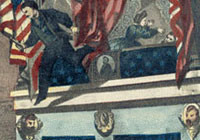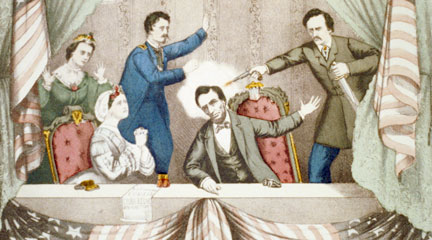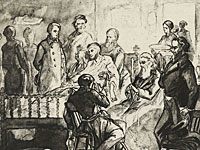What Events Led to Lincoln's Assassination?

Students consult primary and secondary sources to identify the events leading to Abraham Lincoln's assassination and consider whether his assassination was avoidable.
The best thing about this lesson is the primary account of the crime by an eyewitness observer. This account may prove difficult for most 4th graders to read, however and teachers will need to review the materials carefully before they teach the lesson. Very likely they will need to scaffold the reading of the sources. Despite this challenge, we feel that the eyewitness account is direct, dramatic, and engaging, and worth the effort to read carefully. This primary source is supplemented by a timeline linked to evocative images and an ephemera gallery that teachers can use to support student understanding. Using these primary sources along with textbooks, encyclopedias, and trade books, students are asked to "think like journalists" and determine the facts about Lincoln's assassination. Teachers will want to be thoughtful in selecting supplemental sources as many of the sources on the website reflect responses to the assassination rather than causes of the assassination. Students then write a brief report about the assassination, and discuss whether or not it was avoidable. To conclude, students construct a list of questions about what else they would need to know about Lincoln's assassination to more accurately determine if it was avoidable and where they could look to find the answers. While the lesson does not specifically address the concept of sourcing, it provides a great starting point for teachers to approach issues of sourcing and the reliability of evidence with their students.


Yes Information for this lesson is drawn from the Library of Congress and has been prepared by the Gilder Lehrman Institute of American History.
Yes A brief introduction to what happened at the assassination is provided for students. Teachers can link to an extensive collection of materials on Lincoln at the library of Congress. Students are also exposed to the unfamiliar funeral traditions of the 19th century.
Yes Students read multiple primary and secondary sources and write a report about the events that led to Lincoln's assassination.
Yes Students consult multiple sources to construct interpretations. They also consider what other evidence might be needed to confirm their interpretation.
No While students do read multiple sources, they are not asked to read sources of varying perspective, so their reading is more about information gathering than sourcing.
Yes Elementary students will need help with the difficult texts. Reading and vocabulary support are essential, but the simple questions and straightforward activities are appropriate for elementary students. In addition, this lesson would provide older students with valuable practice with close reading of a difficult text.
No No scaffolds are presented in the lesson. Modification of the text, selection of key passages, guided group reading, or some combination of all three would be particularly helpful scaffolds to make the text accessible.
Yes Prompts for assessing historical understanding are provided, however no criteria for evaluating student responses are offered.
Yes The lesson provides adequate instructions for implementation.
Yes This is one of the best things about this lesson. Objectives, an essential question, and logically organized procedures are all included.
